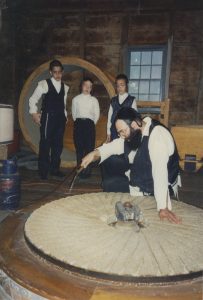
 Situated just off Albany Post Road on the Shawangunk Kill’s west bank, this former gristmill was until recently the oldest continuously-operated, water-powered gristmill in New York State. Built in 1788 by 18-year-old Selah Tuthill, it spurred the settlement of Tuthilltown, which remained a commercial hub and the social and cultural center of Gardiner Township until the construction of the Wallkill Valley Railroad in 1877.
Situated just off Albany Post Road on the Shawangunk Kill’s west bank, this former gristmill was until recently the oldest continuously-operated, water-powered gristmill in New York State. Built in 1788 by 18-year-old Selah Tuthill, it spurred the settlement of Tuthilltown, which remained a commercial hub and the social and cultural center of Gardiner Township until the construction of the Wallkill Valley Railroad in 1877.
The main building is a three-story frame structure, with a gabled roof surmounted by a clerestory, on a field-stone foundation. During the 19th and 20th centuries, the mill underwent a series of upgrades and additions. A more powerful overshot water wheel replaced the undershot wheel as the power source. Between the 1880s and 1910 a vertical-shaft turbine drive system replaced earlier grinding technologies. From the 1980s until 2003, the mill was used to grind kosher matzoh flour. It became home to a restaurant in 2010, which closed in 2019. The wood-beamed interiors and continued presence of functional equipment and stone grinding wheels remain—primarily on the second floor—befitting its 1982 National Register designation. The Gristmill and 36 acres of surrounding property were purchased in 2017 by William Grant & Sons, a fifth-generation Scottish distillery, which already owns Tuthilltown Spirits and Distillery, which is located across the street.
According to Leann Vanderheyden, Site Ambassador for the distillery, the gristmill bar on the first floor is open for business and kept very busy with local visitors and out-of-town tourists. Customers can buy beer, wine, spirits—Tuthilltown’s very own, of course—and mixed drinks at the bar; a highly-regarded taco wagon outside sells food that can be eaten on the outdoor veranda or inside. On the second floor, there is a bar and tables for VIP tours, whiskey tastings, and private events. For example, Corporate customers may taste whiskeys from different barrels and then buy a barrel from the distillery to have the contents bottled with a private label to give to their clients.
Jacob Tschetter, the distillery’s Visitor Experience Manager, explained that work is ongoing to establish a visitor’s center in the gristmill, downstairs where the main bar is located. This should be completed by the end of the year. The community experience is important, and the gristmill and the farm market are to be considered a community space. People should expect to enjoy good food, drink, and music, and have a good time. It matters that the experience be attractive and enjoyable to as wide a range of people as possible, and not just oriented to one group or another.
The owners have been approached about having weddings on site, but this means that they have to be careful regarding issues such as noise ordinances. For example, sound levels cannot exceed 60 decibels after 8:00 pm, which is rather quiet. Obviously, the neighbors must be respected.
On Saturdays a farm market is held in the courtyard/parking lot next to the distillery.
A restaurant is definitely an option that’s being looked into, but it would be a partnership, rather than one owned and operated by the distillery.
